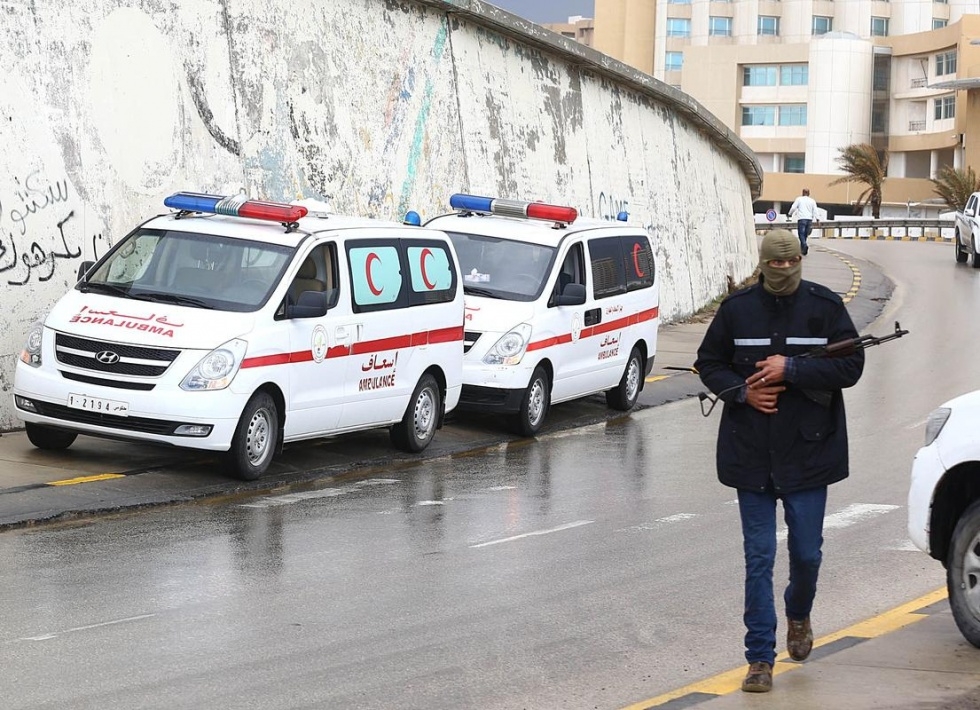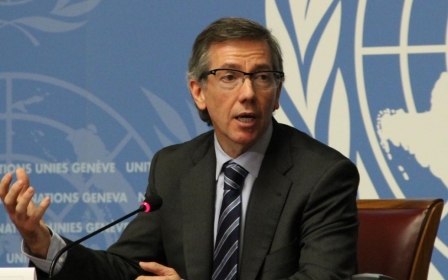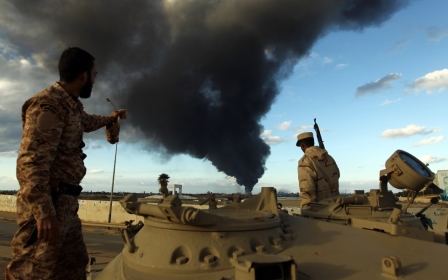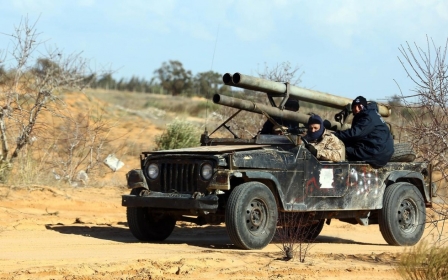Attack on Corinthia Hotel leaves Libya’s Tripoli in shock

TRIPOLI - A bleak and stormy seafront in Tripoli on Tuesday mirrored the atmosphere in the capital, as residents struggled to come to terms with the tragedy of an attack on a luxury hotel that left at least 11 dead.
The incident at the five-star Corinthia Hotel was amongst the most shocking the capital has witnessed since the revolution. Armed men attacked security personnel at the hotel’s guardhouse at around 9am (0700 GMT) and, according to local media, three security guards were killed.
A staff member told MEE how two armed men then entered the hotel and opened fire in the lobby, shouting and shooting haphazardly. One female Filipino guest, the first civilian victim, was hit and is believed to have been killed.
Hotel security staff evacuated guests, including the Prime Minister of the Tripoli-based government Omar al-Hassi, through emergency exits, he said. Other guests who were taken to safety included two newlywed couples who had checked into the hotel for their honeymoon stays the night before. A number of businessmen, including westerners, were also evacuated.
While guests were fleeing, the gunmen spread out around the hotel, some taking the lift, others using the stairs to access upper floors. “It was then that we heard an explosion,” the hotel employee said. “A car near the main gate at the front of the hotel was blown up and I think it killed one of our guards.”
Tripoli’s security forces arrived on the scene and started securing the outside of the hotel and blockading surrounding roads with military and police vehicles.
What followed was a siege lasting almost six hours, during which the attackers appear to have run riot through the hotel, breaking into guest rooms and shooting through doors and into walls, according to security sources who have since been inside the building to try and assess the damage. In separate rooms, two foreign employees of a Libyan airline were reportedly killed - a pilot and an air hostess.
Libyan security personnel who entered the premises tracked the perpetrators down on various floors. Somewhere around the 20th and 21st floors three of the attackers were surrounded and blew themselves up by detonating grenades, according to security sources. Another was shot dead and a fifth was captured.
Social media accounts allegedly belonging to a Libyan branch of the Islamic State (IS) group claimed to be behind the attack. However, the Tripoli-based government announced that it had been a failed attempt to assassinate Hassi, blaming members of the Libyan National Army, operating under the internationally-recognised government now based in the eastern city of Beida.
The total number of victims has yet to be confirmed, although the Libyan news agency LANA said that four security personnel and four non-nationals had been killed.
“We do not yet have the full picture because it is a big place and is being searched thoroughly,” said a spokesman for the Corinthia Group, late Tuesday night. “It was only a short while ago that hotel management were allowed back into the hotel.”
Photographs have been circulated on social media and news agency websites claiming to be stills from CCTV footage taken in the Corinthia showing images of very young men, possibly teenagers, who are said to be behind the attack.
“This was a horrible and tragic day,” a senior hotel employee told MEE. “The victims were just guests. In the end we are all human beings, although we have different religions and different ways of thinking. I see no reason to take anyone’s life.”
The Corinthia Hotel was one of only two luxury hotels that remained open in Tripoli after fighting around the capital last summer made many expatriates, embassies and businesses decide to relocate.
It has long been a popular venue for local events as well as those put on by international companies and NGOs, and also houses of a number of businesses. It is favoured as a superior wedding venue, and its extravagant Friday buffets have been a long-term favourite amongst wealthier local families as well as guests.
“I have no idea what’s going on,” said one young man. “I heard about the explosion so I came here out of curiosity.”
Oblivious to the siege underway inside the hotel but eager to protect their neighbourhood, some local residents in tracksuits carried guns, dashing around and nearly knocking an elderly man pushing a Zimmer frame off his feet. “I heard the explosion from my house,” he said, shaking his head. “This is what happens when you have two governments, two parliaments and two armies - total chaos.”
As civilians were ushered away by grim-faced men in military fatigues, some chose higher vantage points on the walls of the Old Town, from where a firefighter could be seen extinguishing smouldering embers beside a burnt-out car, one of three damaged vehicles in the grounds of the hotel.
“This is something completely new to Tripoli,” Mohamed, a local cafe owner said. “I have lived in this area all my life and nothing like this has ever happened before.” He put the deteriorating security situation down to the legacy of the 42-year dictatorship of Muammar Gaddafi who, he said, had ruined the education and healthcare sectors and left the country with almost no infrastructure.
Middle East Eye propose une couverture et une analyse indépendantes et incomparables du Moyen-Orient, de l’Afrique du Nord et d’autres régions du monde. Pour en savoir plus sur la reprise de ce contenu et les frais qui s’appliquent, veuillez remplir ce formulaire [en anglais]. Pour en savoir plus sur MEE, cliquez ici [en anglais].




